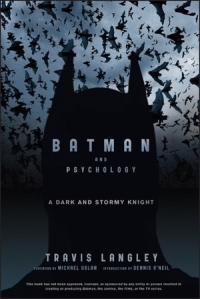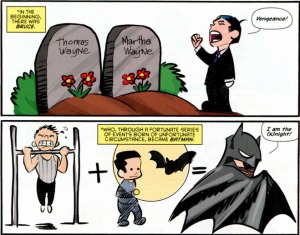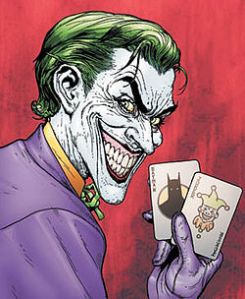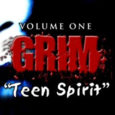 Of all the pantheons in the post-industrial mythological are we find ourselves in, none has so much to do with the human psyche as Batman, the Dark Knight himself. This relation doesn’t just exist in his rogues gallery, of which every type of abnormal behavior is represented, but also in the man himself, as well as those he partners with. Other heroes deal with this darker side of the mind, but none of them is as relate-able as Batman. Most other heroes gain their ability through: radioactive contamination, magical influences, blue people who dispense jewelry, or simply being born on another planet. Batman, however, achieves his prowess from tragedy, and the sheer determination to see it never happen again. There is no magic, there is no real power. It’s one of the most basic fears we experience as a child. The loss of our parents. This provides sense of reality or believability for readers. It’s extreme, but still allows for the elements involving the human psyche to be that much more powerful then it would be for Superman. So, when it was revealed Superherologist, Travis Langley, who holds a B. A. and Ph.D. in Psychology, was to write a book that combined elements of psychological theory and research, along with glimpses into the mind of one of DC’s darkest heroes, I was beyond excited. Batman and Psychology takes a journey through the publication history of Batman while explaining the cause, and mental reasoning, behind the world’s greatest detective. On top of learning how Bruce’s origin affected him so greatly, you also get to see what drives his villains so hard, and why Bruce will never give up his fight.
Of all the pantheons in the post-industrial mythological are we find ourselves in, none has so much to do with the human psyche as Batman, the Dark Knight himself. This relation doesn’t just exist in his rogues gallery, of which every type of abnormal behavior is represented, but also in the man himself, as well as those he partners with. Other heroes deal with this darker side of the mind, but none of them is as relate-able as Batman. Most other heroes gain their ability through: radioactive contamination, magical influences, blue people who dispense jewelry, or simply being born on another planet. Batman, however, achieves his prowess from tragedy, and the sheer determination to see it never happen again. There is no magic, there is no real power. It’s one of the most basic fears we experience as a child. The loss of our parents. This provides sense of reality or believability for readers. It’s extreme, but still allows for the elements involving the human psyche to be that much more powerful then it would be for Superman. So, when it was revealed Superherologist, Travis Langley, who holds a B. A. and Ph.D. in Psychology, was to write a book that combined elements of psychological theory and research, along with glimpses into the mind of one of DC’s darkest heroes, I was beyond excited. Batman and Psychology takes a journey through the publication history of Batman while explaining the cause, and mental reasoning, behind the world’s greatest detective. On top of learning how Bruce’s origin affected him so greatly, you also get to see what drives his villains so hard, and why Bruce will never give up his fight.
It all starts with one question: Is Batman crazy? Langley’s elegant response to that question was  the creation of this book. There are several interpretations of Batman that provide a different mentality to the character. One such story, although obviously not canon, showed Batman as a damaged man who wishes to fight crime. In an effort to appease his young master’s fantasies, Alfred donned the disguise of the Joker to alleviate his psychological trauma; sadly, it eventually leads to his death. Yes, in that case he was probably mad. But what about the others? To find the answer to this question, Langley examines ever facet of the Dark Knight’s past. Included in this exemplary examination of his mind are case-files on all his notorious villains. From the Riddler’s obsessive-compulsive nature, to Two-Face’s dissociative disorder that isn’t always truly dissociative. Every aspect of these rogues and their reasons for being so is explored. Robin, in all
the creation of this book. There are several interpretations of Batman that provide a different mentality to the character. One such story, although obviously not canon, showed Batman as a damaged man who wishes to fight crime. In an effort to appease his young master’s fantasies, Alfred donned the disguise of the Joker to alleviate his psychological trauma; sadly, it eventually leads to his death. Yes, in that case he was probably mad. But what about the others? To find the answer to this question, Langley examines ever facet of the Dark Knight’s past. Included in this exemplary examination of his mind are case-files on all his notorious villains. From the Riddler’s obsessive-compulsive nature, to Two-Face’s dissociative disorder that isn’t always truly dissociative. Every aspect of these rogues and their reasons for being so is explored. Robin, in all  his forms, is also explored as his relationship with Batman is crucial to his mindset. From Dick Grayson, the first child, to his youngest and biological son Damian Wayne, this book provides already established psychological theories for why they turned out the way they did. Most fascinating is the case for Jason Todd, a character many find sympathy for while others loathe him.
his forms, is also explored as his relationship with Batman is crucial to his mindset. From Dick Grayson, the first child, to his youngest and biological son Damian Wayne, this book provides already established psychological theories for why they turned out the way they did. Most fascinating is the case for Jason Todd, a character many find sympathy for while others loathe him.
If you love Batman you will love this book. If you love psychology you will love this book! Do not worry about getting lost though, as Langley does an excellent job explaining everything he discusses so those who have never taken a psychology course will understand. Not only will you get one of the most thorough run downs of Batman’s history in all its mediums, you will walk away feeling like you’ve learned a thing or two about the human mind. This is definitely a book you shouldn’t pass up, as once you start reading it you simply will not be able to put it down! You can order this book from Amazon for $9.99, so it’s definitely worth it.
















を創造する